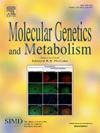Multi-omic analysis of a mucolipidosis II neuronal cell model uncovers involvement of pathways related to neurodegeneration and drug metabolism
IF 3.7
2区 生物学
Q2 ENDOCRINOLOGY & METABOLISM
引用次数: 0
Abstract
Defining the molecular consequences of lysosomal dysfunction in neuronal cell types remains an area of investigation that is needed to understand many underappreciated phenotypes associated with lysosomal disorders. Here we characterize GNPTAB-knockout DAOY medulloblastoma cells using different genetic and proteomic approaches, with a focus on how altered gene expression and cell surface abundance of glycoproteins may explain emerging neurological issues in individuals with GNPTAB-related disorders, including mucolipidosis II (ML II) and mucolipidosis IIIα/β (ML IIIα/β). The two knockout clones characterized demonstrated all the biochemical hallmarks of this disease, including loss of intracellular glycosidase activity due to impaired mannose 6-phosphate-dependent lysosomal sorting, lysosomal cholesterol accumulation, and increased markers of autophagic dysfunction. RNA sequencing identified altered transcript abundance of several neuronal markers and genes involved in drug metabolism and transport, and neurodegeneration-related pathways. Using selective exo-enzymatic labeling (SEEL) coupled with proteomics to profile cell surface glycoproteins, we demonstrated altered abundance of several glycoproteins in the knockout cells. Most striking was increased abundance of the amyloid precursor protein and apolipoprotein B, indicating that loss of GNPTAB function in these cells corresponds with elevation in proteins associated with neurodegeneration. The implication of these findings on lysosomal disease pathogenesis and the emerging neurological manifestations of GNPTAB-related disorders is discussed.
对粘脂病 II 神经元细胞模型的多组学分析发现了神经变性和药物代谢相关通路的参与。
确定神经细胞类型中溶酶体功能障碍的分子后果仍然是一个研究领域,需要了解许多与溶酶体疾病相关的未被充分认识的表型。在这里,我们采用不同的遗传学和蛋白质组学方法描述了GNPTAB基因敲除的DAOY髓母细胞瘤细胞的特征,重点研究基因表达和细胞表面糖蛋白丰度的改变如何解释GNPTAB相关疾病(包括粘脂症II(ML II)和粘脂症IIIα/β(ML IIIα/β))患者新出现的神经问题。两个基因敲除克隆表现出了这种疾病的所有生化特征,包括由于 6 磷酸甘露糖依赖性溶酶体分选受损导致的细胞内糖苷酶活性丧失、溶酶体胆固醇积累以及自噬功能障碍标志物增加。RNA 测序确定了几种神经元标志物和涉及药物代谢和转运以及神经退行性病变相关通路的基因的转录本丰度发生了改变。利用选择性外酶标仪(SEEL)和蛋白质组学分析细胞表面糖蛋白,我们发现基因敲除细胞中几种糖蛋白的丰度发生了改变。最引人注目的是淀粉样前体蛋白和脂蛋白 B 的丰度增加,这表明这些细胞中 GNPTAB 功能的丧失与神经变性相关蛋白的增加是一致的。本文讨论了这些发现对溶酶体疾病发病机制的影响,以及 GNPTAB 相关疾病在神经系统的新表现。
本文章由计算机程序翻译,如有差异,请以英文原文为准。
求助全文
约1分钟内获得全文
求助全文
来源期刊

Molecular genetics and metabolism
生物-生化与分子生物学
CiteScore
5.90
自引率
7.90%
发文量
621
审稿时长
34 days
期刊介绍:
Molecular Genetics and Metabolism contributes to the understanding of the metabolic and molecular basis of disease. This peer reviewed journal publishes articles describing investigations that use the tools of biochemical genetics and molecular genetics for studies of normal and disease states in humans and animal models.
 求助内容:
求助内容: 应助结果提醒方式:
应助结果提醒方式:


